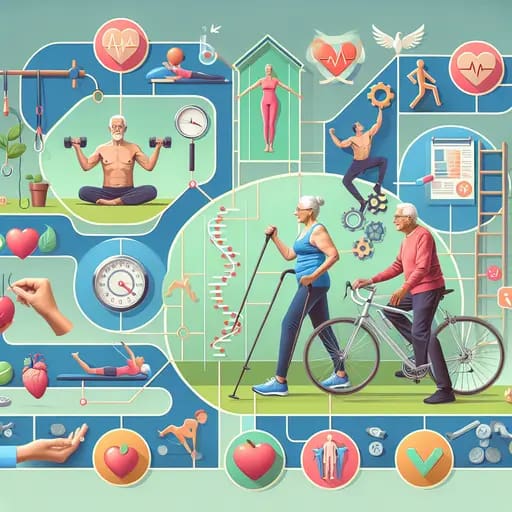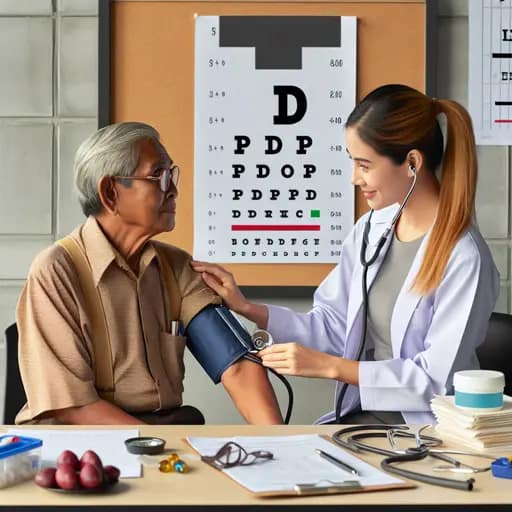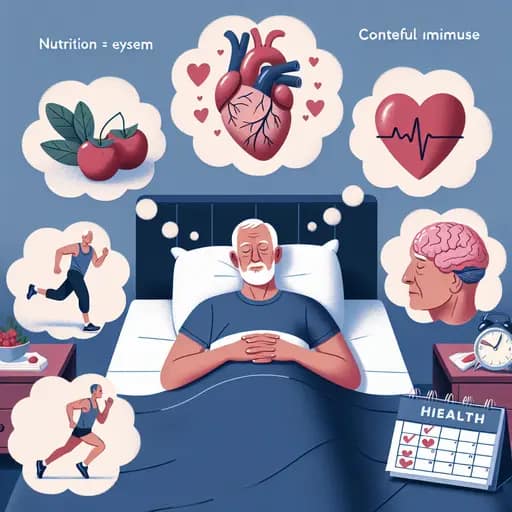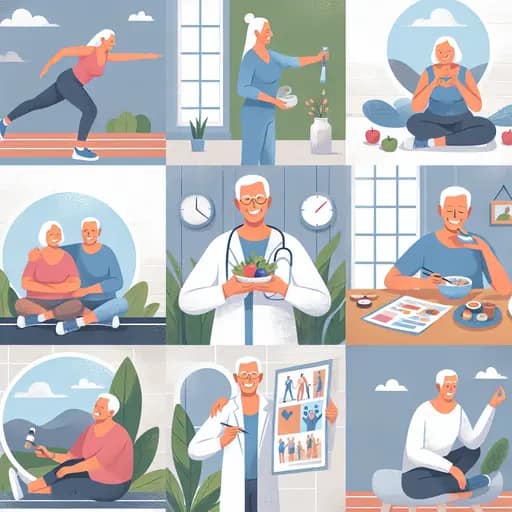Introduction: Importance of Staying Healthy and Fit as You Age
As we age, it is increasingly essential to maintain a healthy and fit lifestyle. This directly impacts our longevity, overall well-being, and ability to enjoy a quality life. In essence, aging healthily is not about avoiding disease, but rather maintaining our physical and mental well-being for long-term happiness. This article delves into the strategies for staying healthy and fit amidst the challenging journey of aging. Here are the key reasons why it’s crucial to stay healthy and fit as you age:
- Strength and mobility: Regular exercise keeps your muscles strong and helps maintain mobility, ensuring you can continue to do daily tasks independently.
- Prevention of diseases: Good nutrition and regular workouts can help prevent a range of health problems, including heart diseases and diabetes.
- Improved mental health: Staying physically active and eating well can also contribute to better mental health, aiding in the management of stress and reducing risk of depression.
- Increased lifespan: By staying fit and healthy, one can significantly increase their chances of living a longer life.
This article will provide you with valuable information on topics like the role of exercise, nutrition tips, social activity, regular health check-ups, stress management, hobbies and activities, and the importance of sufficient rest and sleep in maintaining health and fitness as you age. Equip yourself with the necessary knowledge and reap its benefits for a healthier, happier aging journey.
Stay tuned as we delve deeper and explore each of these aspects in the subsequent sections of this comprehensive guide on ‘How to Stay Healthy and Fit as You Age’.

The Role of Exercise in Maintaining Overall Health and Fitness
In the discussion about staying healthy and fit as we age, the role of exercise is undeniable. Psychological and physiological changes occur as we grow older, but with regular exercise, we can combat these transformations and lead an active, vibrant life. Let’s delve into why exercise is a crucial pillar of health and fitness.
Key Benefits of Regular Exercise:
- Cardiovascular health improvement: Regular exercise plays an integral role in boosting whole body circulation, reducing the risk of heart diseases and stroke.
- Muscle strength and flexibility: Aging often leads to reduced muscle mass and stiff joints. Exercises like weight training or yoga can help maintain muscle strength and improve flexibility.
- Bone health: Weight-bearing exercises can prevent age-related bone conditions like osteoporosis.
- Weight control: Combined with a well-balanced diet, exercising helps manage weight, thereby limiting strain on joints and reducing the risk of obesity-related diseases.
- Mental health: Exercise has proven benefits on mental health, as it triggers the release of endorphins, stress-relieving hormones, leading to improved mood and cognitive function.
To enjoy these benefits, it doesn’t mean you must train for a marathon or hit the gym daily. The key is to find what you enjoy and make it part of your routine. Walking, gardening, swimming, cycling, tai chi, or yoga could be excellent choices. Remember, it’s about active aging, staying involved, engaged, and taking care of your health and fitness.
Finding the Right Exercise Regimen
A successful exercise regimen is achievable when it fits into your lifestyle and addresses your health needs. Here are a few steps to take:
- Check with your doctor: Especially if you have been inactive for a while or have chronic health conditions.
- Start slowly: Begin with low-intensity exercises and gradually increase the intensity and duration as your fitness level improves.
- Balance is key: A well-rounded regimen should include strength training, flexibility exercises, and cardiovascular workouts.
- Stay consistent: Consistency is key in maintaining health benefits. Aim for a minimum of 150 minutes of moderate-intensity exercise per week.
As a rule of thumb, remember to remain committed to your physical health as you age. The best weapon against the aging process is consistent, mindful exercise tailored to fit your lifestyle and health needs.
In the next section, we will explore how nutrition contributes to longevity and wellness, adding to the vital role of exercise in maintaining overall health and fitness.

Nutrition Tips for Promoting Longevity and Wellness
As you age, nutrition plays an essential role in maintaining your health and fitness. Eating a balanced and nutrient-dense diet can enhance your physical and mental well-being, support longevity, and reduce the risk of chronic diseases. This section will provide some practical nutrition tips to help you stay healthy, fit, and vibrant.
- Eat a variety of foods: Your body requires different types of nutrients to function optimally. Aim for a colorful plate with different types of fruits, vegetables, whole grains, lean proteins, and healthy fats for a balanced diet.
- Stay hydrated: Dehydration can lead to symptoms like tiredness, confusion, and dizziness. Make sure to drink enough water throughout the day and avoid sugary drinks and excessive caffeine.
- Limited processed foods: These foods often contain high levels of sodium, sugars, and unhealthy fats. It’s advisable to eat fresh and natural foods.
- Increase dietary fiber: Foods high in dietary fiber can help regular bowel movement and reduce the risk of developing chronic diseases. Include more whole grains, fruits, and vegetables in your diet.
- Monitor your portion sizes: Eating too much, even of healthy foods, can lead to weight gain. Practice mindful eating and control your portions to maintain a healthy body weight.
- Include enough protein: Lean protein sources like fish, poultry, lentils, and legumes can help maintain muscle mass and strength, which is important as you age.
- Limit alcohol consumption: Although moderate alcohol consumption may have some health benefits, excessive drinking can lead to a variety of health issues.
- Take vitamin and mineral supplements if necessary: Consult with your healthcare provider about whether you might need supplements, especially for nutrients like Vitamin D and B12.
In conclusion, catching up on good nutrition habits can make a significant difference in your health and wellbeing, especially as you age. Remember, it’s never too late to start eating healthily. So, commit to these dietary changes and see its positive impact on your life.
Stay tuned to learn more about the importance of social interaction, regular health screenings, managing stress, incorporating physical and mental activities, and sufficient sleep in the upcoming sections.
Up next: “Benefits of staying socially active and connected”.

Benefits of Staying Socially Active and Connected
However, staying healthy and fit as you age isn’t just about maintaining a nutritious diet and regular exercise routine. A significant aspect of overall well-being involves nurturing social connections and staying mentally stimulated. This section will highlight the benefits of staying socially active and connected.
Our social interactions play a significant role in our overall mental and physical health. It helps keep us mentally stimulated, reduces feelings of loneliness, and increases our lifespan. And, our interactions expand beyond human connections to include connections with pets, nature, and our community.
- Enhanced Mental Health: Being socially active can reduce the risk of dementia, ward off depression and improve cognitive functions. Engaging in conversations and social activities can keep the brain exercised and challenged.
- Better Physical health: Friends and social groups can influence us to keep up with a regular fitness routine. Whether it’s having a partner to walk with or joining a fitness class, being socially connected can lead to boosted physical health.
- Increased Longevity: Studies have shown that individuals who maintain an active social life in their later years have a higher chance of living longer. Interaction and companionship can help fight diseases and improve physiological functions.
- Higher Quality of Life: Those who stay socially connected often have a better sense of happiness and well-being. It increases self-esteem, provides a sense of purpose, and helps us enjoy our lives better.
An active social life is more than just an enjoyable pastime. As you can see, it plays a vital role in maintaining health and promoting longevity. So engage yourself in social activities and maintain friendships. Even volunteering in the community, joining interest groups or clubs, taking group classes, and spending time with family can help to stay socially active. Let’s not forget the beauty of technology. Those away from family and friends can utilize technology to stay connected.
In the next section, we will delve into the significance of regular health check-ups and screenings for older adults. Keep reading to discover the integral role routine medical screenings play in holistic health and wellness as you age.
It’s important to remember that any health journey is a balance, and social connections play a significant role in an overall healthy lifestyle. In addition, regular check-ups and being proactive about your health are just as crucial. optimal health cannot be described as a single factor but the amalgamation of multiple factors working in harmony. So maintain a holistic approach that involves nutrition, exercise, social connections, regular check-ups, stress management, and a good night’s sleep. Encouraging an overall healthy lifestyle will ultimately foster a better quality of life. Assign aparity across all these factors, and it’s guaranteed to orchestrate a healthier life amid the golden years.

The Significance of Regular Health Check-ups and Screenings
A critical yet often undervalued aspect of staying healthy and fit as you age is the commitment to regular health check-ups and screenings. These not only help detect any potential health issues early but also provide a comprehensive picture of your overall health status.
Implementing regular health assessments and screenings into your routine can be immensely beneficial in maintaining your health as you age. Here’s why:
- Early detection: Regular checkups and screenings can catch health problems before they become serious. Conditions such as hypertension, diabetes, and cancer are more manageable when detected early.
- Prevention: Prevention is better than cure. Regular screenings, in tandem with a healthy lifestyle, can help prevent certain diseases.
- Updates on health status: Regular check-ups provide an excellent opportunity to monitor your health progress and take note of any changes.
- Maintenance of health records: Regular medical appointments help keep an updated record of your health status, which can guide future treatment strategies.
Regular health assessments comprise various components, including:
- Blood pressure check: This is crucial for detecting hypertension, a common condition in older adults that can contribute to heart disease and stroke.
- Blood tests: These can help identify high cholesterol, diabetes, and kidney or liver diseases.
- Cancer screenings: These tests include screening for breast cancer (mammogram), cervical cancer (Pap test), colon cancer (colonoscopy), and prostate cancer in men.
- Bone density test: This test is particularly important for women, as it can determine the risk of osteoporosis, a disease prevalent in postmenopausal women.
- Eye and hearing exams: Regular eye checks can detect vision problems, glaucoma, and cataracts. Hearing tests are essential as well, as hearing loss is common in older adults and can affect their quality of life.
By prioritizing regular health checkups and screenings, you can stay proactive about your health, empowering you to stay healthy and fit as you age. Remember, your health is your wealth!

Managing Stress and Mental Well-being in Older Age
In the quest to stay healthy and fit as you age, it’s crucial not to overlook the importance of managing stress and emphasizing mental well-being. This mental aspect of healthcare often takes a backseat to physical fitness, but it’s equally important.
As we age, we may experience increased stress and challenges in maintaining mental health due to changes in our lifestyles, social networks, or physical health status. However, there are effective strategies to manage and mitigate these difficulties.
- Practice mindfulness and meditation: These techniques help in calming the mind, reducing stress levels, and improving overall mental well-being.
- Maintain a positive attitude: Having an optimistic outlook can improve mental resilience, which helps in dealing with stress and adversity efficiently.
- Stay socially connected: Relationships and social interactions provide emotional support and help in managing stress. They can also add to a sense of purpose and increase feelings of happiness.
- Cognitive activities: Activities such as reading, puzzle-solving, or learning new skills help in keeping the brain active and reducing the risk of cognitive decline.
- Nurture a hobby: Engaging in activities that you love can serve as effective stress busters and significantly benefit mental well-being.
Also, it’s important to seek professional help when needed. If stress or other mental health concerns become overwhelming, don’t hesitate to reach out to a healthcare provider. A key part of the journey to stay healthy and fit as you age includes maintaining a balanced approach to physical and mental health.
In the next section, we will explore the role of incorporating hobbies and activities that promote physical and mental agility; yet another crucial attribute for staying healthy and fit with the passage of time. Remember, maintaining a sound mind in a sound body will pave the way for aging gracefully and healthily.

Incorporating Hobbies and Activities That Promote Physical and Mental Agility
As you age, both physical agility and mental sharpness are crucial for robust health and longevity. Opting for hobbies and activities that nourish the mind and body is an effective and enjoyable strategy to retain your vitality. Go beyond conventional exercise routines and supplement them with engaging hobbies that challenge both your physical prowess and your mental faculties.
Here are suggestions on ways you can blend fun with health:
- Outdoor Activities: Get fresh air, sunlight, and exercise rolled into activities like gardening, hiking, biking, or bird watching. These hobbies can be an excellent source of low-impact physical activities and can connect you with nature, which has numerous mental health benefits.
- Dance Classes: Be it salsa, cha-cha, or hip-hop – choose your pick. Dancing not only helps maintain flexibility and balance but also keeps you socially active.
- Games and Sports: Engage in collective games and sports like tennis, golf, or bowling. Such activities ensure regular physical activity and also boost coordination and concentration abilities.
- Mind Games: Stimulate cognitive abilities with hobbies such as chess, sudoku, or puzzles that bolster mental acuity and fend off cognitive decline.
- Art and Craft: Activities like pottery, painting, or knitting can work wonders in keeping your fine motor skills intact and offering an outlet for creative expression, thereby carrying profound mental health benefits.
Remember the key ingredients to staying healthy – activity, mobility, and curiosity! Your hobbies and activities should encourage continuous learning and physical movement.
As always consult with your healthcare provider before embarking on new physical activities to ensure they are appropriate for your personal health status. Stay active, stay agile, and enjoy the journey of aging with grace and vitality.

The Importance of Sufficient Sleep and Rest for Overall Health
The path to staying healthy and fit as you age is incomplete without considering the significance of sufficient sleep and rest. Much like nutrition and exercise, quality sleep is pivotal to our physical health and mental well-being, ensuring that our bodies function optimally.
Let’s explore how adequate sleep and rest contribute to maintaining overall health:
- Boosts Immune Function: Sleep bolsters the immune system, helping fend off common ailments. Lack of sleep can make you more prone to infections.
- Enhances Mental Health: Sleep plays a vital role in emotional health and psychological functioning. Insufficient sleep can lead to mood swings, anxiety, and depression.
- Supports Heart Health: Poor sleep has been associated with heart diseases. Ensuring enough sleep can help maintain your heart health.
- Improves Memory: During sleep, your mind consolidates and organizes memories, contributing to improved learning and memory functions.
Now that we’ve discussed why sleep is important let’s look at some strategies to improve sleep quality:
- Create a consistent sleep schedule by going to bed and waking up at the same time every day, even on weekends.
- Create a sleep-inducing environment. This could include darkening your room, keeping the temperature comfortable, and reducing indoor noise levels.
- Limit exposure to screens close to bedtime. The bright light emitted by phones, tablets, computers, and TVs can interfere with your body’s production of melatonin, a hormone that regulates sleep.
- Include physical activity in your daily routine. Regular physical exercise can help you fall asleep faster and enjoy deeper sleep.
Incorporating these sleep hygiene practices not only helps in getting sound sleep but also supports overall health and well-being as you age.
Remember, sleep and rest are not luxuries but necessities. By prioritizing sleep, you are paving the way to a healthier, fitter you, regardless of your age.

Conclusion: Embracing a holistic approach to staying healthy and fit as you age
In conclusion, staying healthy and fit as you age is not simply a matter of sticking to workout routines or keeping an eye on your diet. It is an all-encompassing pursuit that involves adopted a holistic mindset and striking a balance in all aspects of your life. As we have explored through this article, the following key elements constitute this holistic approach:
- Regular exercise: This is instrumental in maintaining your overall health and fitness. Choose an exercise routine that suits your lifestyle and try to remain consistent.
- Healthy nutrition: Nutrition plays a pivotal role in longevity and wellness. As you age, it becomes even more vital to fuel your body with the right nutrients.
- Social interaction: Staying socially active and connected can have a profound impact on your mental and emotional health. Do not underestimate the power of a loving social network and human connection as you age.
- Regular health check-ups & screenings: Regular healthcare visits and screenings can help detect health problems early and in turn, enhance your chances for treatment and cure.
- Stress management: Older age might bring about its share of stressors. By developing effective stress management techniques, you can maintain your mental health in good shape.
- Engaging in hobbies & activities: Partake in activities that promote both physical and mental agility. This will not only keep you entertained but also challenge your mental faculties.
- Adequate sleep & rest: Getting enough sleep is vital as your body uses this time to heal and regenerate. Your overall health appreciably depends on good sleep patterns.
While the journey to staying healthy and fit as you age can seem daunting, remember that small, consistent efforts can lead to significant results. Cherish yourself, make health a priority, and embrace a holistic approach to wellness. Doing so will enable you to enjoy the golden years of your life with vigor, zest, and vitality.
















